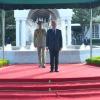Dear Mr. President-Elect:
Ever since your victory was secured, you have insisted that you will be the president of all of us, whether or not we share your views on a host of issues. In your hands, particularly in your future appointments of Supreme Court Justices, rests the future of the freedoms that have become synonymous with the last half of the twentieth century and the beginning of the twenty-first.
Throughout the just-concluded campaign you expressed deep religious convictions. You have every right to derive personal sustenance from these beliefs. However, as our new leader, you have assumed an awesome responsibility that requires you to take as much care in protecting those of us who may hold philosophical views divergent from your own, as you will exercise in looking after the interests of those who share your religious beliefs.
Though I am a white, heterosexual, professional male with a Jewish background-my father is an ordained Orthodox rabbi and my mother was an Auschwitz survivor-I am a member of the most unjustly despised minority in America today. I am an atheist. My atheism does not stem from a desire to be contrary to everything most of my brother and sister Americans believe in. It does not stem from a desire to be different from most other Americans. It does not stem from a desire to shock society or to tear down cherished values. Like most atheists, I simply could not overcome the logical, scientific, and philosophical difficulties encountered when confronting the concepts of a God and the supernatural. Atheists have come to the conclusion that there are no supernatural agencies in our universe. We see the universe as a natural place, with no powers within it that can violate the laws of nature. An atheist is just a person who finds all supernatural claims unconvincing and has the honesty and courage to admit it.
Let me now say that atheists like me have no interest in achieving a society in which we have greater rights than religious believers. We are not interested in destroying the rights of others to practice their religion or to speak publicly in attempting to promote their faith. All we want is a society in which our rights remain equal with those of religious people.
It has become fashionable, not just among Religious Right Republicans, but even among prominent mainstream Democrats like Senator Lieberman, to assert that people who profess belief in a biblical God have a higher morality than those of us who don't. I argue that this is untrue. While we atheists would always preserve the rights of Bible-believers to practice their faith, we also claim full equality with traditional religious believers in the realm of moral virtue. Further, though the Bible is a source of comfort for millions of people in our nation, some of its teachings are morally defective, even unacceptable by modern standards, and cannot serve as the ultimate source of moral virtue.
Mr. President-Elect, I raise all of these points not to strike down your religious faith or the faith of anyone else, but to argue that the viewpoints of atheists should be respected as fully as the perspectives of religious people.
The only way to continue to ensure equality for all people in our country, believers and nonbelievers alike, is to preserve the separation of church and state, especially the ideal of strict neutrality in matters of religious belief. Government bodies must never display bias in favor of belief over nonbelief, and must never get involved in the business of promoting religious belief. As a conservative, you hold that government should be limited, that, in wide areas of human endeavor, individuals should make decisions for themselves without government intrusion. Those of us who believe in this concept want matters of religious belief to remain in the private marketplace of personal choice and not to be dictated or promoted by government in any way. Contrary to popular conception, the separation of church and state is a perfect philosophical fit for conservatives.
On this logic, the Religious Right is an alien presence within the Republican Party. A party, dedicated to maximizing individual liberty through limited government, faces a grave internal contradiction if it allows itself to be dominated by a force committed to harnessing the power of the state to restrict our freedoms based on the teachings of any religious belief system.
The only way to ensure the continued survival of the separation of church and state is by making sure that only those committed to this ideal are nominated to the United States Supreme Court. No one, Mr. President-Elect, now has more power to determine the course and destiny of our highest Court than you. Six Justices on the Court now favor the principle that no branch of government may favor belief over nonbelief. If even two of that current majority are replaced by opponents of church-state separation, then there will be a five-to-four majority in favor of government sponsorship of, and favoritism toward, religion.
You said throughout the campaign that Justices Antonin Scalia and Clarence Thomas best embody the types of Justices you would like to nominate. May I suggest that, in keeping with the Republican Party's goals of maximum freedom for all people in a context of limited government, Justices David Souter and Sandra Day O'Connor far better fulfill your stated ideals. Newsweek reported that, on election night, when it seemed you might be losing, Justice O'Connor was overheard to exclaim that she would not want to retire from her seat on the Court unless you were the president to replace her. And yet, on church-state separation, she is consistently at odds with her two colleagues, Justices Scalia and Thomas. She is, in fact, the originator of one of the most forceful and elegant expressions of church-state separation. She has consistently said that government bodies may not send a "message to nonadherents that they are outsiders, not full members of the political community, and an accompanying message to adherents that they are insiders, favored members of the political community" (Lynch v. Donnelly, 465 U.S. 668, 688 [1984]) and that no branch of government can "treat people differently based on the God or gods they worship, or do not worship" (Board of Education of Kiryas Joel v. Grumet, 512 U.S. 687, 714 [1994]).
Though a dyed-in-the-wool Republican, Justice O'Connor has played a major role in preventing the Religious Right from turning our nation into a theocracy. I urge you to view her as a better prototype for future Supreme Court Justices. Of course, if I could fulfill my deepest wishes, I would be ecstatic to see you actively seek out prospective Supreme Court nominees like Justice Souter. However, being a realist, if I could argue to you the propriety of adjusting your criteria for the Court to favor jurists like Justice O'Connor, I would be deeply relieved.
Respectfully submitted,
Eddie Tabash
















